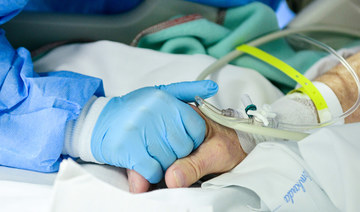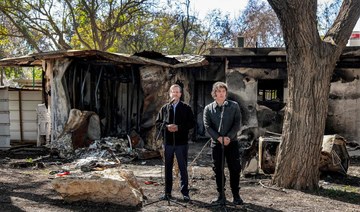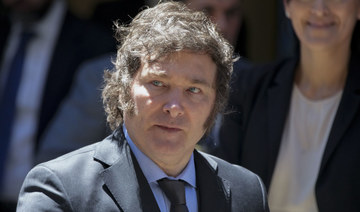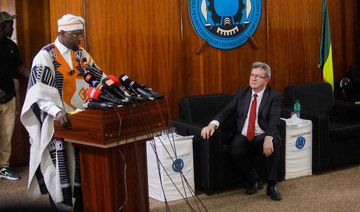WASHINGTON, DC: Since the earliest days of the coronavirus outbreak, the despair wrought on the elderly has been laid bare in nursing homes across the world.
“It’s much harder for nursing homes to get personal protective equipment, or to apply the principles of infection control like hospitals do,” Dr. Elie Antoun Saade, a geriatrician and infectious disease specialist at University Hospitals in Cleveland, Ohio, told Arab News.
Saade, who hails from the town of Wadi Shahrour in Lebanon, has devoted his life to the elderly.
“Both my grandparents had a lot of medical problems before they passed away. When I was still a medical student, I used to care for them,” he said.
In his neighborhood, Saade quickly became reputed for being the elderly’s doctor. “Whenever Mr. George fell or Mrs. Linda had a sore, they’d call on me,” he said.
In a country such as Lebanon, where you lose your insurance upon retirement — just when you need it the most — the elderly are totally dependent on the strong family structure. Relatives and neighbors are there to make up for the total lack of government support.
“In Wadi Shahrour, your very survival depends on your involvement with family and neighbors,” Saade said.
The belief that neighbors are family has stayed with him, even as he emigrated to the US in 2009 and began caring for the elderly in Cleveland, where the government could not be any more anathema to its Lebanese counterpart in terms of providing the elderly with care.
Saade gets personal with his patients. “I want to know how things are functioning at home, who is taking care of them,” he said. “They become like family to me.”
According to the Center for Disease Control, up to 27 percent of 85-year-olds who have contracted COVID-19 have died from it.
More than 70 percent have recovered, “but depending on how hard the virus hit them and how they were treated, they’ve now become dependent,” Saade said.
So what exactly makes the elderly more vulnerable to this disease? “The first thing you learn during geriatric training is that the elderly aren’t a bloc. There’s variation there,” he said.
“But in general, the elderly have what we call a low reserve. They’re able to function well on a daily basis, but if they’re faced with a new threat like the coronavirus, they’ll be harder hit. That’s what we call the frail elderly.”
The aggressive virus could enter through the nose or mouth, and once it is inside, it not only destroys the Pneumocytes — the cells responsible for breathing — but it also attacks the vascular, endothelial cells that line the lung vassals.
That causes inflammation. Water builds up there. And blood clots threaten to form in the lungs and elsewhere.
“The elderly are more at risk, not only due to other underlying problems like lung and heart diseases, but also because when they have an infection in general, and the coronavirus in particular, they don’t know that they have it,” Saade said.
“They don’t display the typical symptoms that other adults have, like a runny nose or a sore throat. Neither do they get a fever,” he added.
“So the disease will progress without being really detected. By the time the symptoms appear, the virus will have advanced to cause inflammation in the heart, the lungs, or wherever the elderly person is most vulnerable.”
The worst damage may be driven by a deranged immune response to the infection, rather than the virus itself.
In the sickest patients with COVID-19, their blood is teeming with high levels of immune system proteins called cytokines.
The body starts to attack its own cells and tissues rather than just fighting off the virus, in what scientists call “a cytokine storm.”
Saade said: “The body goes completely haywire, into uncontrolled inflammation. Too much of the toxic material it produces and directs at the virus turns against the rest of the body and destroys the healthy cells as well.”
He added: “This is where we give patients lupus or rheumatoid arthritis medication, like Aktembra, which, while not directed at the virus, helps with calming the body down.”
As more clinical trials are being conducted on various COVID-19 treatments, Saade sees hope, particularly in Remdesivir, which has shown positive results in a newly published study.
“It doesn’t eradicate the virus but it does provide hope, and having hope in these warlike times is akin to having ammunition,” he said.
But COVID-19 treatment in the US has become as politicized as any other aspect of the crisis, especially with elected officials hyping some medications or treatments without any scientific proof.
Doctors such as Saade often find themselves fighting misinformation instead of focusing on how to tackle the patient’s health, “like when we get a flood of calls insisting on getting a medication that politicians said worked like a miracle, but the negative effects of which, as doctors, we know all too well.”
Saade believes the coronavirus is revealing more than ever the extent of our vulnerability, especially mirrored in our elderly population.

























